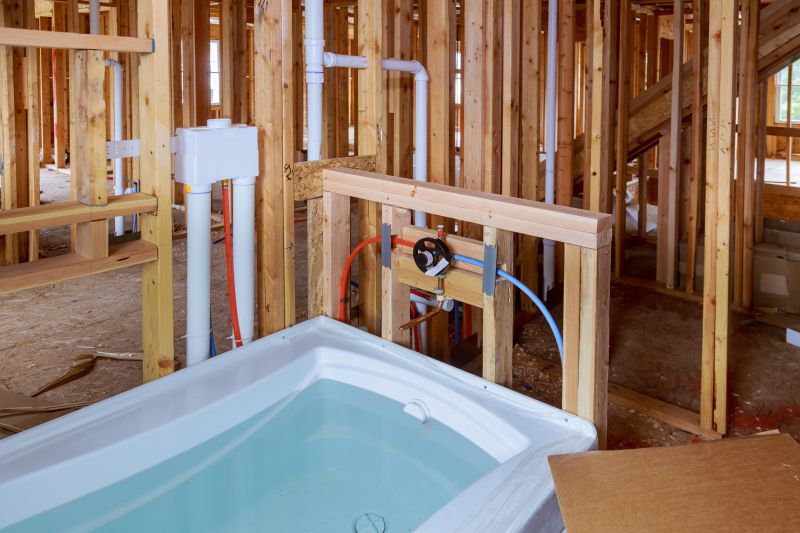Favorite Products For Easy Bathtub Installations At Home
Browse popular items that simplify the installation process and ensure your new bathtub is both functional and attractive.
 Installing a bathtub involves more than just placing a fixture into a designated space; it requires careful selection of compatible products to ensure safety, durability, and ease of maintenance. From the initial planning stages to final touches, understanding the various components involved can help homeowners and contractors achieve a successful installation. Essential elements include the bathtub itself, the surrounding flange or apron, waterproofing materials, and secure mounting hardware. Each component plays a vital role in creating a watertight, stable, and functional bathing area.
Installing a bathtub involves more than just placing a fixture into a designated space; it requires careful selection of compatible products to ensure safety, durability, and ease of maintenance. From the initial planning stages to final touches, understanding the various components involved can help homeowners and contractors achieve a successful installation. Essential elements include the bathtub itself, the surrounding flange or apron, waterproofing materials, and secure mounting hardware. Each component plays a vital role in creating a watertight, stable, and functional bathing area.
Top Overall Option
Universal Bathtub Installation Kit
A comprehensive installation kit that includes all necessary hardware, waterproofing materials, and detailed instructions. Designed to accommodate a variety of bathtub sizes and types, this kit aims to simplify the installation process while ensuring secure and watertight connections. Suitable for both professional contractors and DIY enthusiasts seeking a reliable solution for bathtub setup.
Types of Products For Bathtub Installations
Acrylic Bathtubs
Lightweight and easy to maintain, acrylic bathtubs are popular for their versatility and affordability.
Fiberglass Bathtubs
Known for their durability and smooth finish, fiberglass units are common in many residential bathrooms.
Cast Iron Bathtubs
Heavy and long-lasting, cast iron tubs provide excellent heat retention and classic appeal.
Corner Bathtubs
Designed to fit into corner spaces, these tubs maximize bathroom area and often include additional features.
Drop-in Bathtubs
Installed into a pre-built deck or surround, offering a seamless look and customizable design.
Undermount Bathtubs
Mounted beneath a countertop or surround for a sleek, modern appearance.
Walk-in Bathtubs
Feature low thresholds and doors for accessibility, suitable for those with mobility needs.
Soaking Tubs
Designed for relaxation, these deep tubs provide ample space for full-body immersion.
Jetted Tubs
Equipped with water jets, these tubs offer hydrotherapy features for enhanced comfort.
Clawfoot Tubs
Vintage-style tubs with distinctive feet, often made from cast iron or acrylic.
Freestanding Tubs
Stand-alone units that add aesthetic appeal and flexibility in bathroom layout.
Vessel Bathtubs
Sit on top of the surrounding deck, creating a striking focal point in the bathroom.
Integrated Shower and Tub Combos
Units that combine bathing and showering functionalities for space efficiency.
Accessible Bathtubs
Features like grab bars, non-slip surfaces, and ergonomic design for safety and ease of use.
Luxury Spa Tubs
Premium models with features like chromatherapy, air jets, and heated surfaces.
Popular Choices
Favored for their lightweight nature and ease of maintenance, acrylic tubs are common in many homes.
Affordable and straightforward to install, fiberglass remains a popular choice for remodels.
Their aesthetic appeal and flexibility make freestanding tubs a trending option for modern bathrooms.
Ideal for maximizing space, corner models are frequently chosen in smaller bathrooms.
Versatile and customizable, these tubs are often selected for custom bathroom designs.
Increasingly popular for accessibility, walk-in tubs are a practical choice for safety.
Hydrotherapy features continue to attract users seeking relaxation and therapeutic benefits.
Their distinctive look makes vessel tubs a popular statement piece in contemporary bathrooms.
Their vintage charm maintains popularity among those restoring or enhancing traditional bathroom styles.
High-end features and comfort options keep spa tubs trending in upscale renovations.
Designs focused on safety and ease of entry are increasingly in demand for inclusive bathroom spaces.
Modern and sleek, undermount installations are favored in minimalist bathroom designs.
Proper installation also involves selecting the right plumbing fittings and fixtures that match the existing water supply lines. Ensuring compatibility between the drain assembly, overflow, and faucet connections is crucial to prevent leaks and facilitate smooth operation. Additionally, considerations for accessibility and user comfort may influence the choice of features such as grab bars, slip-resistant surfaces, or custom tiling that complements the bathtub unit.
When choosing products for bathtub installations, durability and material quality are key factors. Materials like acrylic, fiberglass, and cast iron each offer different benefits and maintenance requirements. The installation process may also require specialized tools and accessories, such as leveling shims, sealants, and support brackets, to achieve a professional finish. Whether remodeling a bathroom or installing a new bathtub in a construction project, selecting the appropriate products can contribute significantly to the longevity and safety of the installation.
In the context of Beaver Dam, WI, local suppliers and hardware stores often carry a wide range of bathtub installation products suitable for various project scopes. Consulting with local experts can provide insights into regional building codes and best practices, ensuring that the installation meets all safety standards and performs reliably over time.
Key Buying Considerations
- Material durability and maintenance requirements of the bathtub.
- Size and shape to fit the bathroom layout and user needs.
- Compatibility with existing plumbing and drain configurations.
- Accessibility features for users with mobility challenges.
- Installation method, such as drop-in, undermount, or freestanding.
- Weight of the bathtub and floor support requirements.
- Water capacity and depth for comfort and functionality.
- Design style and finish to match bathroom decor.
- Availability of replacement parts and warranty support.
- Cost considerations including installation and accessories.
- Local building codes and regulations compliance.
- Ease of cleaning and long-term upkeep.
- Presence of additional features such as jets, heaters, or lighting.
- Environmental conditions like humidity and ventilation in the bathroom.
- Compatibility with surrounding fixtures and cabinetry.
